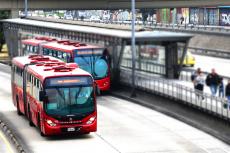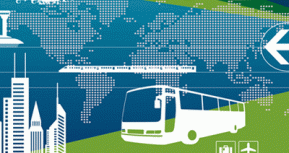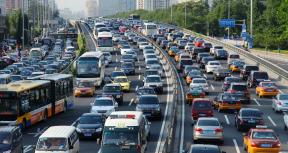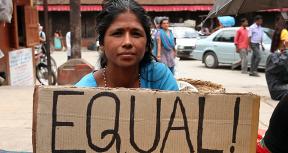How Has the World Bank Supported Urban Transport?
The World Bank Group’s transport sector strategies have for decades emphasized the importance of urban transport for development and shared prosperity. The World Bank Group’s urban transport portfolio provided five main types of support : urban roads, conventional bus, bus rapid transit (BRT), metro or urban rail, and upstream support focusing on policy and the sectoral framework.
- In the 1990s, strategy focused on efficiency, competition, and financial viability, and evolved to address multiple dimensions of sustainability: economic, social, and environmental. Increasingly, the strategy emphasizes mobility and accessibility for the poor and disadvantaged, and associated considerations such as targeted subsidies to enhance public transit affordability.
- The World Bank Group has advocated policies for building local government capacity to manage increasingly decentralized sectoral responsibility, for mobilizing private participation in the supply of urban transport services, for increasing transport safety, and for protecting the environment.
- Most recently, the sectoral theme is “Sustainable Mobility for All.” IFC and MIGA have not articulated their own urban transport strategies, but the operations they have financed, advised, or underwritten generally support the World Bank Group policy framework.
- During the 10-year evaluation period(FY07–16), the World Bank Group invested $25 billion in urban transport projects. Of the 297 financing projects active at some point during the period, the World Bank was responsible for 93 percent of projects, worth $23.5 billion, with MIGA and IFC delivering the balance. 148 projects were closed during the period and 104 were evaluated. In addition, the World Bank carried out 165 Analytic and Advisory Activities, and IFC delivered 15 IFC Advisory Services products.
Progression of World Bank Group Strategies Relating to Urban Transport

See Chapter 1: Why Urban Transport Matters, and Chapter 2, The World Bank Group’s Portfolio Support for Urban Transport
Key Findings
The World Bank Group has played a strong role in supporting urban transport development in client countries. Continuous support has effectively enhanced the capacity and quality of service delivery. The World Bank Group has promoted private sector provision of services in ways that have strengthened their financial sustainability. It has used its interventions to help clients mitigate environmental harm from urban transport systems. World Bank Group interventions have also enhanced institutional capacity to administer urban transport service provision. The achievement of these intermediate outcomes should contribute to economic development and the welfare of the disadvantaged. Further, though the World Bank Group’s finance is small compared to the unmet need, it has proven its ability to use its knowledge and convening power to spread good practices and promote South-South learning.
Nonetheless, there are important gaps:

- Balancing the Portfolio. The evaluation portfolio revealed some imbalances that merit careful attention. The broader imbalance between middle- and lower-income countries is most evident in Africa, where a sharply declining portfolio is compounded by the loss of expertise that could contribute to a new generation of activity. The apparent mismatch in this region lies between portfolio and external conditions, with the fastest urbanization of any region. Further, the second half of the review period (2012–16) saw a retreat from public transport and NMT operations.
- Including the disadvantaged (the poor, women, disabled persons, and the elderly). Although World Bank Group urban transport projects often discuss challenges to the disadvantaged, the portfolio does not reflect consistent attention in project design to improve the access for the poor, women, disabled persons and elderly. Only about 7 percent of urban transport projects had targeted interventions to meet the special needs of women and only 10 percent had targeted interventions for disabled persons and elderly. Although the cost of services is a common constraint for disadvantaged groups, the project-level support to address affordability concerns is often lacking, limiting the effects of the World Bank Group’s support of mobility improvement for the disadvantaged. Ex ante analysis of impacts on women, and a focus on security and amenities for women, were the exception rather than the norm. Where targeted interventions were provided, projects seldom tracked the impacts on these disadvantaged groups. The opportunity to mainstream support for the disadvantaged, to routinely utilize affordability analysis, and to learn from results are all project design features whose potential remains untapped.

- Benefit of Comprehensive Engagements. Experience in mobility and environment suggest that the World Bank Group can achieve more impact when it engages more comprehensively, working both upstream (on policy and institutions) and downstream (on operations), and working on both enhancing the supply of, and managing the demand for, urban transport. The evaluation found World Bank Group projects that incorporate both travel demand management (avoiding travel and shifting modes) and supply measures were able to commit more to mobility and achieve more improvements, and were more likely to sustain outcomes than projects that focused only on supply. Though demand management has proven less politically palatable, “package deals” of supply and demand improvements appear to be more effective. The evaluation also found that World Bank Group support for downstream mitigation through urban transport projects generated only localized impacts. Addressing environmental sustainability at a policy level, coupled with an investment operation, showed a better chance of environmental success. However, policy support can only be effective if it is enforced.
- Strengthening Work Quality. IEG found several indications of inconsistent work quality and practices that limited the potential impact of World Bank Group urban transport interventions:
- First, the analysis of project financial viability, cost, and timing appeared frequently optimistic. Ex ante analysis often ignored an explicit consideration of subsidy, maintenance costs, and alternative options.
- Next, IEG found that data weaknesses and indicator inconsistencies across projects limit learning and accountability. Missing indicators, inconsistent indicators, absence of baseline measurement, absence of measurement over project life, and absence of sustained M&E of urban transport services beyond project life were common characteristics of the urban transport evaluation portfolio.
- Last, communication (and coordination) between the institutions of the World Bank Group appeared weak in urban transport engagements. Regarding private sector participation, the PPP work of the IFC and MIGA in some cases appears to be disconnected from relevant “upstream” work of the World Bank. Consequently, there may be unrealized investment opportunities involving private service provision of urban transport services. This finding is especially relevant to the recent formal embrace of the “cascade approach” which gives priority to private sector participation in infrastructure investments.
For a quick introduction to these evaluations, watch the videos
In Brief: Improving Urban Transport in Developing Countries and Urban Transport Matters








